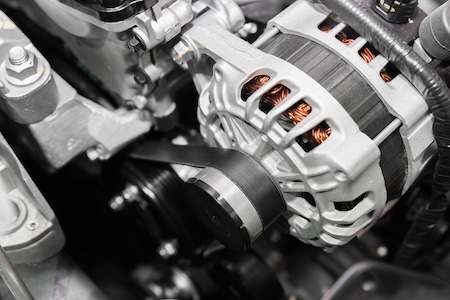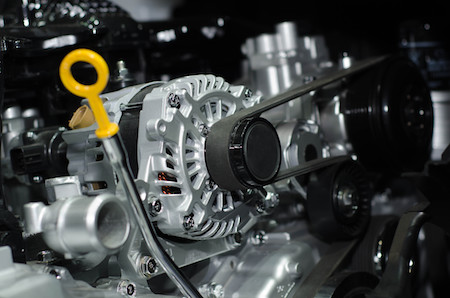What does an alternator do, anyway? You hear about it, but you aren’t quite sure.
Its primary job? To keep your battery charged while you drive and to power your electrical system. Every time you turn on your headlights, use your infotainment system, or crank the heat, your alternator is hard at work converting mechanical energy into electrical current.
When it fails, the results can be serious. And that can be bad news if you’re out on Colorado roads. Imagine a breakdown on a cold winter morning, or on one of our remote roads. That can be inconvenient or even dangerous.
Yep, your alternator is important. So let’s break down the top five signs your alternator might be failing, and why it pays to act fast.
Your Battery Keeps Dying
This is one of the most common—and misleading—symptoms of a failing alternator.
At first glance, it may seem like your battery is the problem. You jumpstart your car and it runs fine … for a while. But if your battery keeps losing charge, the real issue might be your alternator failing to recharge it as you drive.
Here’s what you should look for:
- Needing frequent jumpstarts
- A new battery that dies quickly
- Dimming lights or sluggish electrical systems even when the engine is on
All of these are signs it might be your alternator. A dead battery is annoying, but if the alternator is to blame, you could be minutes from being stranded with a car that won’t start again.
Dim or Flickering Headlights and Interior Lights
Ever notice your headlights seem unusually dim when idling at a stoplight, then brighten as you accelerate? That’s a telltale sign your alternator is struggling to provide a consistent current.
Your alternator powers all of your vehicle’s lighting while the engine is running. When it starts to fail, it might still generate some power, but it won’t be enough to handle everything.
You may notice:
- Dim dashboard lights
- Headlights that flicker or fade in and out
- Cabin lights that pulse with engine RPM
We get it, it’s sometimes difficult to tell how bright your lights are with the big city lights. But driving through dark mountain roads or snowy evenings without consistent headlights is more than just frustrating, it’s dangerous. Check it from time to time, especially if you change up where and how you drive. If your lighting is acting up, get your alternator checked.
Strange Noises From Under the Hood
A failing alternator can sometimes make itself known through sound.
The alternator has a rotor that spins rapidly inside a housing, driven by a belt connected to your engine. If the bearings inside begin to fail or the belt becomes misaligned or loose, you may start to hear some unwelcome sounds.
You’ll notice it if you hear:
- A whining or grinding sound that increases with acceleration
- Chirping or squealing from a worn or slipping serpentine belt
These noises may point to worn-out internal parts or belt issues that can cause your alternator to stop charging altogether. Catching it early can save you from being stranded or facing more expensive repairs.
Warning Lights on Your Dashboard
Ever ignored the little lights on your dashboard? We get that not all of them indicate “stop your car now” situations. That little battery-shaped warning light on your dash doesn’t just mean your battery is low; it can also indicate a charging issue, including a failing alternator.
In many vehicles, when the alternator fails or voltage drops too low, the electrical system will trigger a warning.
Look for dashboard lights such as:
- Battery light
- Check engine light
- ABS or other system errors related to voltage fluctuation
Sometimes these warnings come and go. Don’t ignore them. They’re your vehicle’s way of telling you something is wrong. More importantly, inconsistent voltage can cause your car to run erratically, affecting engine performance, power steering, and other systems. Don’t wait for it to get worse.
Electrical Failures Across the Vehicle
Your car’s alternator powers more than you might realize. It includes your:
- Power windows
- Heated seats
- Stereo system
- Windshield wipers
- GPS
- Phone charger
- Dashboard displays
If you’re noticing that multiple systems are acting strange, glitching, or failing entirely, even though your battery is new, your alternator may not be keeping up.
Watch for:
- Random electrical malfunctions
- Glitches in your infotainment or climate control
- Failing power seats, mirrors, or locks
If it runs on electricity and it’s failing, your alternator might be the root cause.
Bonus: Colorado Drivers, Take Extra Precautions
Colorado weather doesn’t mess around. And Denver drivers face a few unique alternator stressors:
- Extreme Temperature Swings: From freezing mornings to hot summer afternoons, temperature shifts can wear down alternator components faster.
- Mountain Drives: Steep climbs and descents increase engine strain and make electrical systems work harder, especially headlights, brakes, and onboard computers.
- Winter Load: Heaters, defrosters, and heated seats increase electrical demand, revealing alternator problems faster.
That’s why regular checkups matter even more here in Denver, especially if you take advantage of all Colorado has to offer. Catching a failing alternator early can keep you off the side of I-70 or stuck in a snowy parking lot.
What To Do If You Suspect a Failing Alternator
If you’ve noticed one or more of these signs, don’t wait until your car leaves you stranded. Schedule an inspection.
At our shop, we’ll:
- Test your alternator output with specialized equipment
- Check your battery health and charging system
- Inspect belts and connections for wear or corrosion
- Recommend the best fix based on your vehicle and driving habits
Many alternator issues start small, and are simple to fix. Left unchecked, they can lead to bigger, more expensive problems like a dead battery, faulty sensors, or computer errors.
A healthy alternator is essential for a safe and reliable car. It powers the systems you rely on every day.
So when something feels off, don’t brush it off. Your alternator may be trying to tell you it’s on its way out.
Bring your car in for a quick check. We’ll make sure everything’s running smoothly so you can drive with confidence, whether you’re commuting through Denver traffic or heading for the hills.


 Because the alternator is a vital component of your car, it’s important to learn the warning signs and know how a problem will impact the ride. Here are some of the warning signs that may materialize.
Because the alternator is a vital component of your car, it’s important to learn the warning signs and know how a problem will impact the ride. Here are some of the warning signs that may materialize.